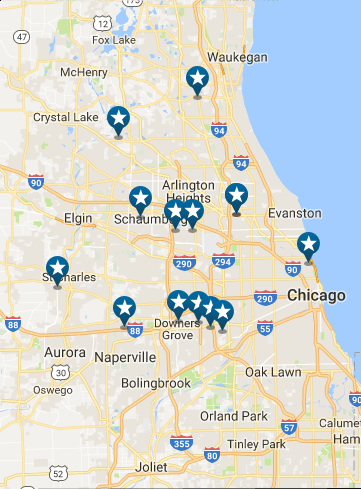Scheduling Your Consultation Appointment
Whether you are a patient making your own appointment, requesting a second opinion, or you are a physician making a patient referral, you can start the registration process simply by telephoning your nearest clinic. When you first visit one of our centers, you will register with that hospital as an outpatient. Please bring your insurance cards with you for your appointments. You may also need authorizations if required by your insurance plan. This registration process can take 15-30 minutes, so please arrive early for your appointment.
First Visit – Consultation
If you are considering radiation therapy, you must first schedule a visit with a radiation oncologist to see if radiation therapy is right for you. During your initial visit, the doctor will evaluate your need for radiation therapy and its likely results. This includes reviewing your current medical problems, past medical history, past surgical history, family history, medications, allergies and lifestyle. The doctor will also perform a physical examination to assess the extent of your disease and judge your general physical condition. Depending on where your radiation oncologist practices, you may also be seen by a medical student, a resident (radiation oncologist in training), a nurse practitioner or a nurse, a physician assistant.
After reviewing your medical tests, including CT scans, MR scans and PET (positron emission tomography) scans and completing a thorough examination, your radiation oncologist will fully discuss with you the potential benefits and risks of radiation therapy and answer your questions.
Simulation and Treatment Planning
To be most effective, radiation therapy must be aimed precisely at the same target or targets every time treatment is given. The process of measuring your anatomy and marking your skin to help your team direct the beams of radiation safely and exactly to their intended locations is called simulation. During simulation, your radiation oncologist and radiation therapist place you on the simulation machine in the exact position you will be in during the actual treatment. Your radiation therapist, under your doctor’s supervision, then marks the area to be treated directly on your skin or on immobilization devices.
After simulation, your radiation oncologist and other members of the treatment team review the information they obtained during simulation along with your previous medical tests to develop a treatment plan. Often, we perform a special treatment planning CT scan to help with the simulation and treatment planning. This CT scan is in addition to your diagnostic CT scan. Frequently, we use sophisticated treatment-planning computer software to help design the best possible treatment plan. After reviewing this information, your doctor writes a prescription that outlines the exact course of your radiation therapy treatment.
Patient Responsibilities During Treatment
Daily Treatment Schedule: On your day of simulation, you will be given a time to come for daily treatment for several weeks. Please arrive a few minutes before your scheduled time, as there are normally patients treated before and after you. In the occasional chance that you may be late or unable to come, please call us and we will do our best to accommodate you. A short wait before your treatment is not unusual. We ask that you reserve an hour a day, but the usual total treatment and preparation time is less than thirty minutes. Clothing and Marks: Since treatment delivery often will require the removal of your clothes to uncover the area being treated, wear loose fitting clothing that is easy to remove. The marks placed on your skin are critical to target the tumor must be maintained throughout the treatment course. Do not rub off the marks. You may shower and expose the treated area, but do not rub the area with soap or a towel. Instead, “pat dry” the area gently. Also, wear older clothes, as marks may rub off onto your clothing. Transportation: If you drive, you should be able to drive yourself to and from the treatment center daily. If you have a medical problem that limits your ability to drive, the physician may advise you not to drive. If you are unable to find anyone to drive you, the hospital may provide assistance.
Treatment Instructions for External Beam Radiation Therapy
When you undergo external beam radiation therapy treatment, each session is painless, like getting an X-ray. The radiation is directed to your tumor from a machine located outside of your body. One of the benefits of radiation therapy is that it is usually given as a series of outpatient treatments and you may not need to miss work or experience the type of recuperation period that can follow other treatments. These treatments are usually five days a week, excluding Saturday and Sunday, and may continue for many weeks. Sometimes, only one or a few treatments are required, such as treating cancer that has spread to the bone. It will take roughly five to 15 minutes for you to be positioned for treatment and for the equipment to be set up. Once you are positioned correctly, the therapist will leave the room and go into an adjoining control room to closely monitor you on a television screen while administering the radiation. There is a microphone in the treatment room so you can talk with the therapist if you have concerns. The machine can be stopped at any time if you are feeling ill or uncomfortable. The radiation therapy machine may be moved by the radiation therapist to target the radiation beam to the exact area of the tumor. The machine might make noises during treatment that sound like clicking or whirring. These noises are nothing to be afraid of, and the radiation therapist is in complete control of the machine at all times.
Weekly Visits with a Radiation Oncologist
During radiation therapy, your radiation oncologist and nurse will see you regularly to follow your progress, evaluate whether you are having any side effects and address any concerns you may have. If you are having a problem there is no need to wait until your weekly doctor visit. The doctors and nurses will usually be able to take care of the problem right away.
Daily and Weekly Imaging
Your treatment team will routinely use the treatment machines to take special X-rays called beam or port films or quick CT scans done on the treatment table. Your treatment team routinely reviews these films to be sure that the treatment beams remain precisely aimed at the proper target. These images are generally not used to evaluate your tumor.
Side Effects
Patients often have few side effects from the radiation therapy and can continue their normal routines. However, some patients feel some discomfort from the treatment. Be sure to talk to a member of your radiation oncology treatment team about any problems you may have. The side effects of radiation therapy are related to the area being treated. For example, a patient with breast cancer may have skin irritation, but a patient with lung cancer may have soreness when swallowing. These side effects are usually temporary and can be treated by your doctor and improve soon after finishing treatment. We encourage you to talk with your doctor or nurse about side effects so they can give you information about how to manage them and may prescribe medicines that can help improve your symptoms.
After Treatment Follow-Up
After treatment is completed, we’ll schedule follow-up appointments so that your doctor can make sure you are recovering normally and continue monitoring your health status. Other tests may be ordered for these visits and reports will be sent to your other doctors. Your radiation oncologist may decrease the frequency of visits over time, but you are always welcome to call or come in for questions or concerns.
Billing Information
The delivery of radiation treatments is complex and involves tasks performed by multiple people. Some of these people and their roles will become apparent as you have treatment. However, there are also many people who work behind the scenes. The cost of radiation therapy is similar to other specialized treatments. Most insurance companies will cover the cost of radiation therapy. If you do not have insurance, our centers will do our best to work with you. We want to provide you the best care possible.
The bills you receive will depend upon the facility at which you are treated. For example, if you are treated at one of our hospital-based facilities, you will receive two separate bills. One bill is for the physician’s charges, which includes the initial consultation to review your records and discuss treatment, your treatment planning and delivery by determining the method and dose of radiation utilized, CT imaging of your body to carefully review each place that needs to be treated and normal structures that should be avoided, management and supervision of your daily treatments, verification imaging to ensure that the exact planned area is being treated with millimeter accuracy, and custom blocks used for blocking the area not treated. You will also receive a separate hospital bill for the use of the equipment, supplies, nursing and treatment staff, your treatment plan, daily treatments and verification films.
Questions?
If you have any questions regarding your physician’s bill for radiation treatment, please contact ROC’s billing office by calling (847) 698-0600. If you have any questions regarding your hospital bill, please contact the billing office of the respective hospital directly. The phone number for the hospital’s billing office will be on your statement
.
Insurance
ROC’s insurance contracts mirror the contracts that our hospital partners have. To find out if we accept your insurance carrier, please contact ROC’s billing office by calling 847-698-0600. ROC’s billing staff will work with you to determine if your insurance covers services with ROC physicians and the hospital where the service will be provided.








